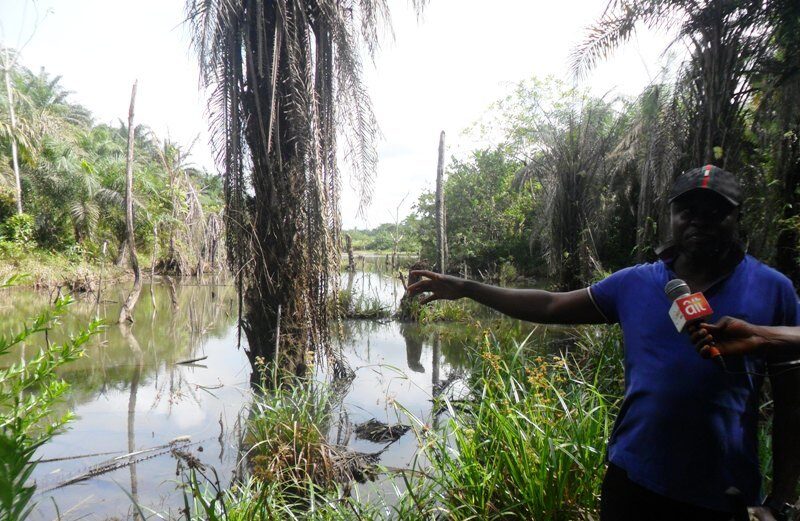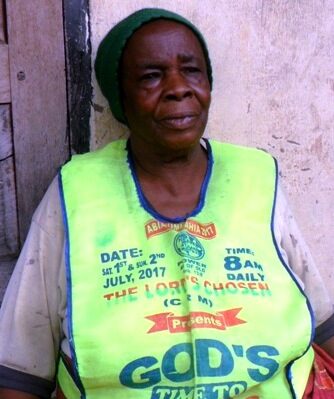Besides the fact that Nigeria’s last remaining primal tropical rainforests in Cross River State are gradually wearing away due to activities of individuals and corporate organisations.
Some Cross Riverians are accusing Wilmar International, a Singaporean multinational company, of land grab, exploitation and refusal to pay compensation over the alleged destruction of sources of their livelihood/fountains of drinking water. Our Correspondent, JOSEPH KINGSTON, who visited communities in Akamkpa and Biase local government areas hosting Wilmar, and spoke with 88 years old widow, Chronicles happenings in the said communities.
Wilmar International is believed to be one of the world’s largest processors of palm oils. In 2012, the company acquired Biase, Calaro and Ibiae estates in Akamkpa and Biase local government area of Cross River State with a total land area of 19,173km for oil palm plantation development with a projection to expand it to 50,000 hectares within a few years.
The concession was signed by the government of Nigeria which was represented by the then Agriculture Minister, Akinwunmi Adesina. Wilmar’s operations cover such areas as Betem/Ehom, Akpet and Idoma communities in Biase local government area and Mbarakom/Uwet/Njagachang and Mfamosing/Aningeje in Akamkpa local government area.
The latest report indicated that Wilmar’s plantations in Cross River are altogether estimated at 26,318 hectares, including Calaro Extension with 2,369 hectares, Ibad plantations in Akamkpa with 7,805 hectares; Kwa Falls in Akamkpa /Akpabuyo with 2,014 hectares, and Oban plantations, also in Akamkpa, with 2,986 hectares.
In 2012, the locals saw the advent of Wilmar as an answered prayer for resuscitation of the moribund Calaro and Biase plantations with the hope of employment of Cross River youths to work in the vast plantations.

However, a few years later, they say their lofty hope is fast eroding. They are also accusing the company of refusing to pay compensation for crops and farmlands/ palm plantations destroyed by chemically polluted erosion water channelled into their farmlands by Wilmar.
Some Non Governmental Organisations, and NGOs, notably Rainforest Resource and Development Centre (RRDC), also came out to accuse the company of non-compliance with the legal provisions regarding the Environmental Impact Assessment (EIA) and other stipulations on land use, an accusation Wilmar rejected.

Some months ago, Dr Maurice Olory, National Secretary/Volunteer Coordinator of another Non-Governmental Organisation, Community Forest Watch, told our reporter that his office was inundated with a series of complaints from Akamkpa and Biase natives over Wilmar’s activities and purported impunity
Glory, who doubles as Chairman of the NGO in Cross River State, in an interview, said, “we have complaints from natives relating to activities of Wilmar which is carrying out large scale palm oil production in Calaro/Ibiae oil palm estates.
“One of the complainants, a widow from Akamkpa, narrated how Wilmar’s activities have impoverished her and her entire family as their only source of livelihood, a farmland and palm plantation, inherited from her late husband had been destroyed.”
Our reporter, who took a trip to Akamkpa and Biase and went right into the said forest for an inquest, observed that there is a large span of land, at the eastern axis of the plantation, which was taken over by a pool of water which came through kilometres of trench purportedly dug by Wilmar for security reason. Every plant planted in that span of land was gone as the lake-like pool has no outlet.
Orient Daily spoke with the said widow, 88-year-old Madam Veronica Asuquo, whose narratives were punctuated by emotional outbursts, and also interviewed Wilmar’s Sustainability Managers, Asen Ako and Antigha Esien Edet
Richard Asuquo, the first son of the aged woman, who volunteered to speak on his mother’s behalf, said, “my family is sad that our ancestral land which borders Wilmar plantation in Akamkpa has been destroyed. My family has had that land from time immemorial, planting palm estate when the State government was encouraging individuals to collect palm seeds and plant them to assist in improving their condition of living.
“When the State government sold the former Calaro palm estate to Wilmar who took over both assets and liability of the estate, the company decided to use heavy earth-moving machines to clear the land and to replant. In the course of that work, they blocked the natural courses of streams and channelled the water to our plantation resulting in an uncontrollable flood which has destroyed and wiped out our economic trees and other plants.
That is the only source of livelihood for an 88-year-old widow.
“We are appealing that the Wilmar and Cross River State government look into this level of injustice. The government’s paramount responsibility is the welfare of its citizenry, and Wilmar should be called upon to pay compensation of two hundred and fifty million Naira (N250 million) or more, depending on the assessment of the damage done to the plantation. We called on Wilmar management to visit the said plantation themselves and see the damage done to us.
“Apart from the erosion water which has been channelled to our plantation, the chemicals they use in their activities have killed every green plant, cassava, vegetables and other cash crops as well as economic trees as you could see. The water, which has no outlet, grows every day, particularly during this rainy season. The land and the crops are all gone. The more painful thing is that they are not discussing anything about compensation.”
OrientDaily further learnt that the youths themselves were angry that the coming of the company has brought them pain. They are accusing the company of taking parcels of land which were not initially allocated to them in 2012, in connivance with some chiefs and elders to perpetually exploit them.
Onda Bassey, a young man who described himself as a student leader, alleged that the company had refused to employ indigene as senior staff, adding that his people were regretting ever allowing Wimar to set their feet on Biase and Akamkpa lands because, according to him, the company has not lived up to expectations.
To confirm the insinuation of total neglect by Wilmar, Bassey took our reporter to a brownish-coloured stream, which he claimed was their only source of drinking water before the arrival of the company but has now been completely polluted by activities of the Wilmar, leaving them helpless without sources of good drinking water.
“I do not know why Wilmar decided to ruin our socio-economic lives. They said they would build a borehole for us. We were excited but the said borehole functioned for only a few months and packed up, even when it was functioning, it was pumping out brownish water which is not good for human consumption.
“Despite the teeming population of our educated youths who could handle any section of Wilmar’s operations, they have refused to employ our people as senior staff to be among management cadres except as labourers. Of what good is this company in our land,” he asked rhetorically.
Asked to comment on the alleged sell-out levelled against some Elders and Chiefs, Chief Moduck Ojah Uka of Eqazak village in Akpet Central of Biase, said the allegations may not be far from the truth considering the way some elders were protecting the interest of the company but absolved himself of connivance.
However, in an interview, the company said all the allegations were false, adding that the company was not aware of any destruction done to the native’s farmland since there is no formal complaint whatsoever from anybody. They said the company was not grabbing any land but was using only what they paid for when they took over existing but moribund State-government owned Ibiase and Calaro estates directly from authorities in Calabar.
Asen Ako, Sustainability Manager, flanked by Antigha Essien Edet, Corporate Affairs Manager said “Calaro Estate and Ibiae estates are long existing plantations set up by the State Government in 1954 and 1963 respectively. Biase Plantations Limited (BPL) through a state government privatization process purchased Ibiae Estate (5,594.012 ha) with survey plan No. RIU/CR/113/11 and Calaro Estate (5,549.801 ha) with survey plan No.ASC/CR/EBA/11/254. There has been no additional land acquisition from chiefs or any individual to increase the size of Calaro Estate beyond what was handed by the state government.
“Biase Plantations Limited does not use or discharge any toxic chemicals into nearby waterbodies or the environment. Thus, saying that toxic chemicals have left our plantation to destroy palms, cassava, vegetables, etc. is not true as all agrochemicals used in our estates are also used by other agro-industries and local farmers and have not been proven to have such adverse effects on surrounding farms. We are not aware of any incident as described.
“We have a Community Liaison Officer, CLO, who they should report to or come to us directly but nobody has told us of any erosion water in any farmland. If they do, we would have looked into it. They can still lodge their complaints. We also have a legal department which handles the issue of compensation if any. When the government handed over the land to us, some squatters in the plantation were compensated.”
On the issues of corporate social responsibility and the pollution of Betem streams, he said, “Our Corporate Social Responsibility is not poor. Our operations have not destroyed or adversely impacted water quality in Betem. However, as for the borehole constructed at Betem, it will interest you to know that since the construction of that borehole, four major repairs have been conducted by the company. The problem is poor management and neglect in reporting issues of the borehole to BPL management. The community is not yet ready to take full management of the borehole donated by Biase Plantations Ltd.
“BPL has a robust CSR package for communities around its operation and this package is geared towards education, capacity building, health, employment, and economic development. In our support of education around our catchment area, we have committed N253,785,027 (Onun Secondary school Mbarakom– 100% completed); N116,574,542 (Camp 2 Primary School – 50% completed); N104,627,161.70 (Ibiae Primary School – 90% completed); N226,160,500 (Aningeje Secondary School – 75% completed).”
Ako, who later took our reporter to the said Onun Secondary School, located adjacent to the entrance to the Biase plantation, said, “We are still putting in more money to make sure that all the schools become reference standards and from were future managers of the company will be educated and under the best learning condition. In our schools, we make provision for libraries, computer labs and science labs, we also provide free housing for teachers within the campus, free electricity and much more.
“As part of our CSR, we have offered 144 tertiary education scholarships since the 2014/2015 school year. The scholarship is awarded each year to two students from each of the 20 communities that make up our catchment area, totalling 40 students annually. The scholarship is such that once a student starts benefiting, it goes on till the student completes the course enrolled in the university.
“As a capacity building program, we have initiated an outgrower program through which local farmers come into cooperative and access loans to develop an outgrower oil palm plantation using high yielding planting material from our estates. This outgrower is the best way to empower the local communities financially and independently.
“Since 2012, we have provided 19 boreholes in different communities around our projects. Another 7 boreholes are proposed for 2018. We also grade access roads to communities upon request and need assessment. In our community health program, we also conduct annual free medical health camps within the surrounding communities. We are the largest private employer in the state as we have more than 3000 workers mostly Cross Riverians and indigenes in particular.”
Despite these explanations, the 88-year-old woman is insisting that immediate action be taken over the challenges in her farmland, and that compensation be paid before she joins her ancestors. But until that happens, the situation would remain painfully the same.
